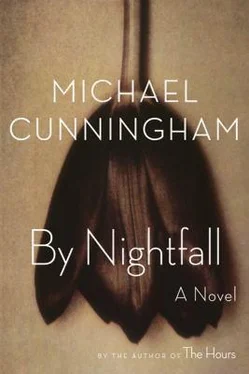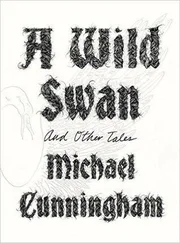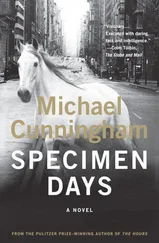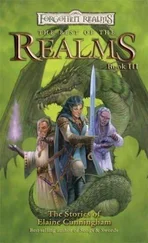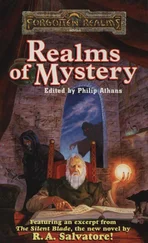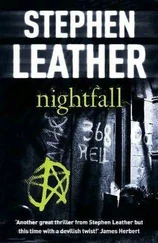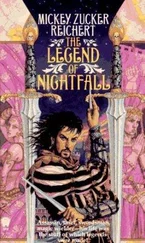“Hey, man.” A deep cello of a voice, potent.
“Hey.” Peter Harris, cool dude.
The buzzer buzzes and he’s inside the lobby, if lobby is the word for it—he’s inside the flickering fluorescence of the beige-linoleumed entranceway, devoid of distinguishing features save for a faded black board behind cracked glass on which, in intermittently missing white stick-on letters, are listed the names of small companies that have probably been dead for at least twenty years.
Peter gets into the elevator, which smells, oddly, of grape bubble gum. The door shuts asthmatically and Peter thinks briefly about getting stuck in the thing, or worse, getting just short of the sixth floor, where Groff’s studio is, and falling. Try not to think about the rat-gnawed cables that are hauling your ass upward, please God (or whatever tentative deity Peter turns to at nervous moments), don’t let me die in an elevator on my way to see work I’m not sure about, it would be too horribly fitting—Peter Harris meets his end as he endeavors to see an artist whose work is neither protean nor seminal, who is producing something pretty good that Peter thinks he can sell.
When the elevator reaches the sixth floor it pauses, trembling slightly, door still shut, and Peter is embarrassed to realize that he’s actually gone sweaty-palmed by the time the doors wheeze open.
They open directly onto Groff’s studio. Motherfucker has the whole goddamned floor. This would be family money. Even a young hotshot like Groff doesn’t make this much, this fast.
Peter steps out of the elevator into a crepuscular columned vastness, like the grand foyer of some grimy dilapidated palace, all but empty (except for a slightly surreal parlor arrangement, a ratty old sofa and two Windsor chairs, various shades of putty and bone), dirty light slanting in through the sooted windows. And here, preceded by the sound of his boot heels on the splintery floorboards, is the artist himself. Peter knows the drill—they never stand right by the elevator, waiting to greet you. The worst sin, in their world, is overeagerness and a desire to please, though of course most of the ones who succeed are riddled with and riven by both. The ones who really and truly don’t care usually end up as small-town eccentrics somewhere along the Hudson Valley, arguing with whomever will listen about integrity as the only virtue that means a goddamn thing, perpetually preparing for their annual show at some local gallery.
And now, Rupert Groff.
He’s got it down. Pale and pudgy in a rock star way (how do some of these kids do it, how are they ragged and out of shape and yet ineffably cool?), shock of disheveled dark red hair, big doughy endearing face, like a young Charles Laughton. Wearing a tissue-thin T-shirt that bears the Oscar Mayer logo, gray Dickies work pants.
“Hey-ho,” he says. He has, no denying it, a marvelous, rich, musical voice. In another life, he could probably sing.
“Peter Harris. A pleasure.”
He extends his hand, which Groff pumps. Peter is a man in a suit, at least twenty years older than this boy, there’s a limit to how hey-ho he’s willing to be.
“Thanks for coming by,” Groff says. Okay, he’s not arrogant, or at any rate not insufferably arrogant. Or is at any rate waiting to let his arrogance show later.
“Thanks for having me.”
Groff turns and heads into the loft’s inner dimness. Peter follows.
“So,” Groff says. “Like I said over the phone, I’ve only got a couple of bronzes right now, but they’re nice ones. They’re… they were for my show at Bette’s.”
We’re not going to touch that subject, not yet.
Peter says, “And as I told you, I have a great client, I think she’d be perfect for one of the bronzes.”
“What’s her name?”
“Carole Potter.”
“I don’t know her. What’s she like?”
Shrewd. Even for ready money, you don’t want to sell your work to just anyone.
“She lives in Greenwich. She’s eclectic, and she’s not prim. She’s got a Currin and a Gonzalez-Torres and the most exquisite Ryman she bought back when you could still get them.”
Best not to mention the older stuff, the Agnes Martin, the Oldenburg sculpture in the north garden. Most of the new kids worship some of the older masters and despise others, and there’s no way of guessing which venerable figure will turn out to be a young artist’s godhead, and which the devil incarnate.
“Do you think I’m a little edgy for her?” Groff says.
“The collection needs more edge, and she knows it. Frankly, your piece would be replacing a Sasha Krim.”
“That shit is nasty.”
“Too nasty for Carole Potter.”
Toward the rear of this dim vastness hangs an old mouse-colored curtain from a long iron rod. Groff pulls back the curtain, and they enter the studio proper. He’s decided, it seems, for reasons Peter can’t begin to decipher, to give the loft an absurdly large entrance—a lobby, if you will. Maybe it’s a Wizard of Oz trick, meant primarily for visitors like Peter—a wait-till-you-see-what’s-behind-the-curtain strategy.
Behind the curtain is the studio, a jerry-rigged roomlike room maybe fifteen feet square. Groff is more orderly than some. He’s put up a pegboard wall from which various tools hang, some of them quite lovely, assorted wire scrapers and long wooden paddles and wood-handled awl-like implements, all meant for the shaping of wax and clay. The studio is filled with the smell of warm wax, which is not only lovely but strangely soothing, as if it linked up with a childhood memory, though Peter can’t imagine what infantile ministrations could conceivably have involved hot wax. The first oracle at Delphi was a hut made of beeswax and birds’ wings—maybe it’s racial sense memory.
And here, on a heavy-legged industrial steel table: the object itself. A four-foot-tall bronze urn, beautifully burnished to that green-ochre particular to bronze, with a foot and handles, classical at heart but given pomo proportions, the base smaller and the great looping handles bigger than any artisan in the fifth century B.C. would have considered; that hint of cartoonishness, of animal jauntiness, that rescues it not only from imitation but from any hint of the tomb.
Okay. At first glance, it passes the context test. It has gravity and charisma. Although gallery people don’t like to talk about it, even among themselves, this is one of the problems that can arise—the simple fact that in a hushed white room with polished concrete floors, almost anything looks like art. There can’t be a dealer in New York, or anywhere, who hasn’t gotten variations on that phone call: loved it in the gallery, but now it seems all wrong in our living room. There’s a standard response: art is sensitive to its environment, let me come over and if we can’t make it work I will of course take it back… But really, more often than not, what happens to the piece when it arrives in a living room is, it lacks the potency to stand up to an actual room, even if the room itself is awful (as these rooms so often are—the rich tend to love their gilt and granite, their garish upholstery fabric that cost three forty a yard). Most of Peter’s cohorts blame the rooms, and Peter understands—the rooms are often not only gaudy and overdone, they have that sense of the conqueror about them, and the painting or sculpture in question usually enters such rooms as the latest capture. Peter, however, has other feelings. He believes that a real work of art can be owned but should not be subject to capture; that it should radiate such authority, such bizarre but confident beauty (or unbeauty) that it can’t be undone by even the most ludicrous sofas or side tables. A real work of art should rule the room, and the clients should call up not to complain about the art but to say that the art has helped them understand how the room is all a horrible mistake, can Peter suggest a designer to help them start over again?
Читать дальше
Конец ознакомительного отрывка
Купить книгу
